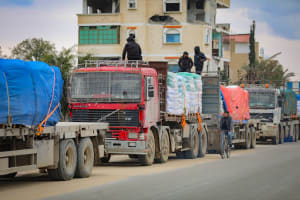Israeli hostage protests continue under fire: 365 terrible days

Families, friends, and thousands upon thousands of Israelis determined to see the return of the hostages in Gaza have continued to protest as much as they are able under wartime restrictions. The rallies have reached hundreds of thousands, the largest protests ever seen in Israel’s history. However, now the maximum number allowed to gather has been limited to 2,000 following the IDF Homefront Command restrictions as the risk of incoming rockets has increased.
Israel is currently in the period between Rosh Hashanah and Yom Kippur, the 10 days between the Jewish New Year and the Day of Atonement known as “the Days of Awe” or the “terrible days” (“yamim noraim”).
Banners declaring “365 Terrible Days” mark a year that's gone by since 251 people were violently kidnapped and abducted into Gaza by Hamas terrorists. Today, 97 are still being held in captivity, along with another two Israeli citizens in separate incidents before Oct. 7, and the bodies of two Israeli soldiers who were captured in 2014.
Rallies were held in multiple cities throughout Israel, with protesters accusing Israeli Prime Minister Benjamin Netanyahu. There is distrust among some Israelis concerning the government’s failure to reach a deal, with accusations of ulterior motives on the part of the prime minister.
Omri Lifschitz, son of hostage Oded Lifschitz (84) says he holds Netanyahu responsible that his father is still in Gaza. He believes the prime minister has spurned deals to stay in power.
In his statement, he noted the next Israeli elections, scheduled to be held in three years, and he promised to protest without ceasing.
“As long as Netanyahu is in power, we will also mark three years of their captivity, if any of them last that long,” he said. He accused Netanyahu of sabotaging deals on the table with “criminal moves” and “lying spin” regarding the condition of maintaining Israeli presence in the Philadelphi Corridor.
Lifschitz asserted that the need for Israeli presence along the Gaza-Egypt border “has been refuted over and over again by members of the security establishment.”
Danny Elgarat, whose brother Itzik (70) is among the captives in Gaza said, “This was a full year in which those kidnapped became hostages of the war for Netanyahu’s political survival. A full year, in which Netanyahu torpedoed deals that were on the table. A full year in which 101 citizens were abandoned by him, and are still held in the tunnels of death, and Netanyahu not only doesn’t take responsibility, he chooses deliberately to abandon them, and to try to make us forget them.”
The government has assured some hostage families that there will be a renewed effort to secure a hostage deal once the situation in Lebanon with Hezbollah forces becomes less intense, but many remain skeptical.
Einav Zangauker, mother of hostage Matan (25), said, “We don’t believe this government. It’s been a year since the [security] failure, and today it’s clear that Netanyahu doesn’t want to return the hostages. Even if the war in the north ends, Netanyahu wants the war in the south to continue.”
The Jerusalem Post reported the release of a statement from the Hostages and Missing Families Forum.
"There will be no victory or rehabilitation without the return of all the hostages home. We will not rest until each and every one of them returns home – the living for rehabilitation and the murdered for a proper burial in their own country. The State of Israel must act immediately, without delay."
With much of the focus now directed toward operations in northern Lebanon against Hezbollah, the statement urged, 'The hostages do not have time for calm in the north. As we have unfortunately come to know, they not only suffer – they are also murdered.'"
"Every day in Hamas hell is an eternity in which the hostages are in immediate danger of death. How is it possible to know where every senior or junior member of Hezbollah is, but there is no idea where the hostages have been kept in Gaza for 365 days?"

Jo Elizabeth has a great interest in politics and cultural developments, studying Social Policy for her first degree and gaining a Masters in Jewish Philosophy from Haifa University, but she loves to write about the Bible and its primary subject, the God of Israel. As a writer, Jo spends her time between the UK and Jerusalem, Israel.














